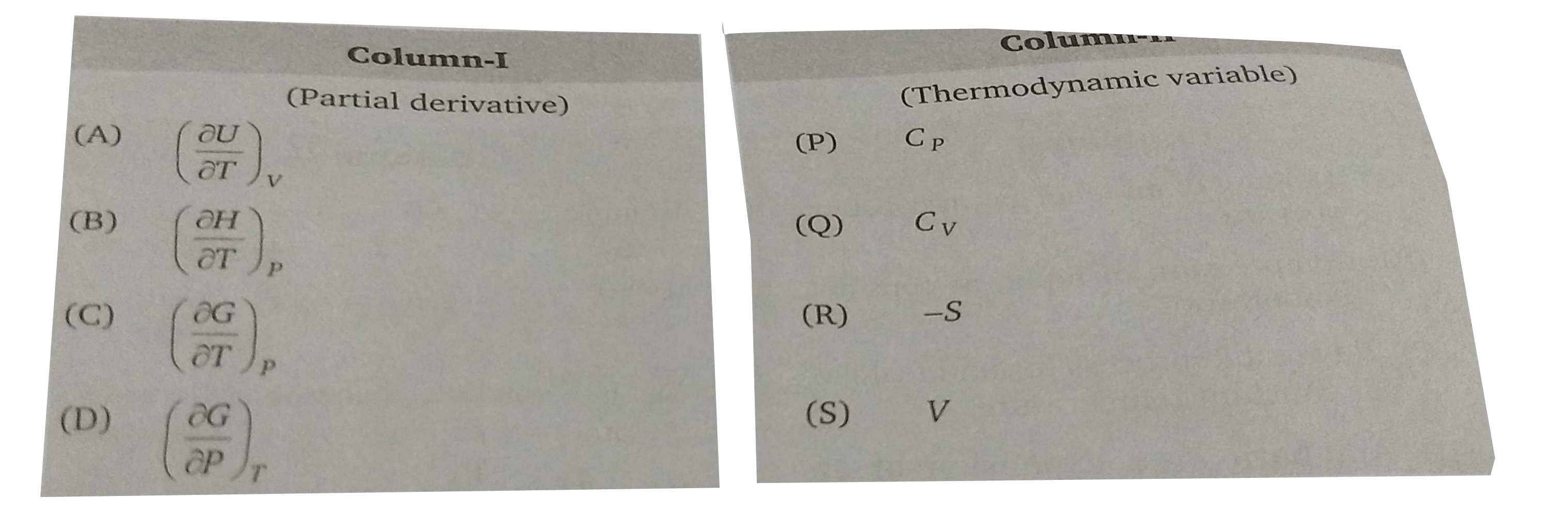For polytropic process PVx = constant, molar heat capacity (Cm) of an ideal gas is given by:Solution in Punjabi
Cv,m+R(x−1)
Cv,m+R(1−x)
Cv,m+R
Cp,m+R(x−1)
The correct Answer is:B
dU=dq+dw
nCv,m.dT=nCm.dT−P.dV
Cm=Cv,m+P.dVn.dT ….(1)
PVn=KandPV=nRT
∴ KV1−n=nRT
K(1−n)V−n.dV=nRdT
dVdT=nRK(1−n)V−n …(2)
from Eqs. (1) and (2)
Cm=Cv,m+R1−n
Topper's Solved these Questions
- BOOK - NARENDRA AWASTHICHAPTER - THERMODYNAMICSEXERCISE - Level 3 - One Or More Answers Are Correct1videos
THERMODYNAMICS
- BOOK - NARENDRA AWASTHICHAPTER - THERMODYNAMICSEXERCISE - Level 3 - Match The Column2videos
THERMODYNAMICS
- BOOK - NARENDRA AWASTHICHAPTER - THERMODYNAMICSEXERCISE - Level 2 (Q.1 To Q.30)1videos
THERMODYNAMICS
- BOOK - NARENDRA AWASTHICHAPTER - STOICHIOMETRYEXERCISE - Level 3 - Subjective Problems20videos
STOICHIOMETRY
Similar Questions
Assume ideal gas behaviour for all the gases considered and neglect vibrational degrees of freedom. Separate equimolar sample. Separate equimolar samples of Ne, O2 , CO2 and SO2 were subjected to a two process as mentioned. Initially all are at same state of temperature and pressue.
Step I → All undergo reversible adiabatic expansion to attain same final volume, which is double the original volume thereby causing the decreases in their temperature.
Step → After step I all are given appropriate amount of heat isochorically to restore the original temperature.
Mark the correct option(s) :05:44View SolutionMatch the following columns
 01:36View Solution
01:36View SolutionWrite structure of 2,2-dimethylheptane.
13:54View SolutionWhat volume of a liquid (in L) will contain 10 mole ? If molar mass of liquid is 280 and its density is 1.4 g/mL.
03:54View SolutionA polytropic process for an ideal gas is represented by equation PV^(n) = constant . If g is ratio of specific heats ((C_(p))/(C_(v))) , then value of n for which molar heat capacity of the process is negative is given as
02:24View SolutionFind the molar heat capacity (in terms of R) of a monoatomic ideal gas undergoing the process: PV1/2=constant?
06:55View Solution(a) A polytropic process for an ideal gas is represented by PV^(x) = constant, where x != 1 . Show that molar specific heat capacity for such a process is given by C = C_(v) + (R)/(1-x) . (b) An amount Q of heat is added to a mono atomic ideal gas in a process in which the gas performs a work (Q)/(2) on its surrounding. Show that the process is polytropic and find the molar heat capacity of the gas in the process.
05:09View SolutionAn ideal gas expands according to the law pV2= constant (a) Is it heated or cooled ? (b) What is the molar heat capacity in this process?
03:38View SolutionFor polytropic process PVn = constant, molar heat capacity (Cm) of an ideal gas is given by:
03:40View Solution9.The molar heat capacity of a polytropic process (PV^(n)) is C=C_(v)+(R)/(10) .The value of the polytropic exponent n is ?
03:40View SolutionAn ideal has undergoes a polytropic given by equation PV^(n) = constant. If molar heat capacity of gas during this process is arithmetic mean of its molar heat capacity at constant pressure and constant volume then value of n is
04:36View SolutionFind the molar heat capacity of an ideal gas with adiabatic exponent gamma for the polytorpic process PV^(n)= Constant.
02:20View SolutionFor polytropic process PVn = constant, Cm (molar heat capacity) of an ideal gas is given by
01:51View SolutionFor polytropic process PVn = constant, Cm (molar heat capacity) of an ideal gas is given by
02:45View SolutionFor polytropic process PVn = constant, molar heat capacity (Cm) of an ideal gas is given by:
06:34View SolutionAn ideal has undergoes a polytropic given by equation PVn = constant. If molar heat capacity of gas during this process is arithmetic mean of its molar heat capacity at constant pressure and constant volume then value of n is
02:33View Solution

